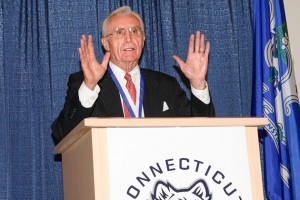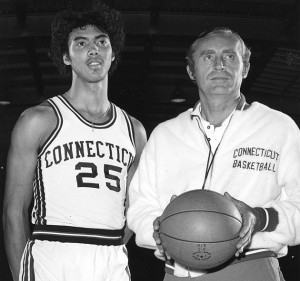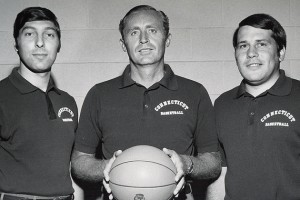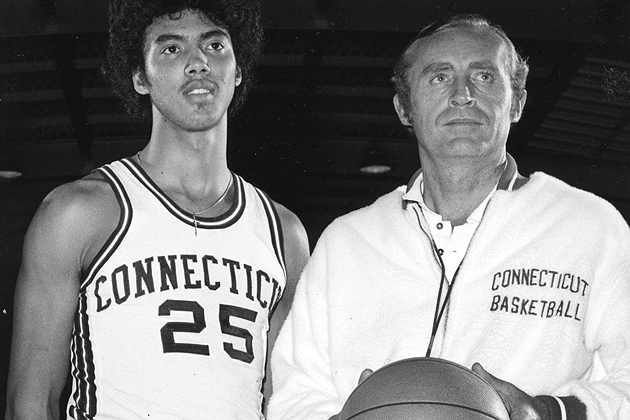Thirty-two years after a political decision took the Olympics away from Donald “Dee” Rowe, the University of Connecticut is doing all it can to give them back.
Rowe, the former UConn men’s basketball coach and longtime Special Adviser for Athletics, and his wife Ginny will be traveling to London on Aug. 3 to represent UConn at the Games of the XXX Olympiad – a trip orchestrated by U.S. women’s Olympic basketball coach Geno Auriemma, with the full support of UConn President Susan Herbst and Athletic Director Warde Manuel.

“I couldn’t be more thrilled or more appreciative for the opportunity to represent our school,” Rowe said. “I’m extremely grateful to President Herbst, to Warde, and of course, to Geno. It’s wonderful that they made this happen. Ginny and I are very, very excited.”
If anyone is owed a trip to the Olympics, however, it is Rowe, who was honored to be chosen as an assistant coach for the U.S. Olympic men’s basketball team in 1980, but had his dream punctured when then-President Jimmy Carter declared a U.S. boycott of the Moscow Games as a protest over the Soviet invasion of Afghanistan.
It was a tremendous disappointment for Rowe, U.S. head coach Dave Gavitt and the team of college players who had gone through tough trials to be selected to defend the gold medal the Americans had won in 1976 under Dean Smith. Gavitt and Rowe, longtime friends, had worked together as head coach and assistant, respectively, for the U.S. National Team in 1975. After successful coaching stints at Dartmouth and Providence College, Gavitt, of course, would go on to be the founding father and first commissioner of the BIG EAST Conference.
“I had met Dave when he was 18 years old and playing at Dartmouth College in 1947,” Rowe said. “My basketball coach at Middlebury was Tony Lupien. He went to Dartmouth to be Doggie Julian’s assistant in basketball and head baseball coach. Dave pitched for him and played basketball and that’s where I met him. I became athletic director and basketball coach at Worcester Academy after getting out of the army and Tony called me up and said, ‘I’d like Dave to have a job with you,’ and we hired him. He was my assistant in basketball, the freshman baseball coach, the cross country coach, had dorm duty four nights a week, all for $3,000. He was like my son, or my younger brother.
“A few years later, a priest, Father St. George, who I had played with and we were close friends, came to see me and told me Joe Mullaney at Providence had just lost his assistant coach, who was going back to coach high school. I said, ‘I got the kid right here. He’s a diamond in the rough.’ And Dave was on his way to Providence.”

When Gavitt was selected to be the Olympic coach for the 1980 Games, he hardly hesitated before asking Rowe, who had retired as the head coach at UConn in 1977, to join his staff.
“I was off-the-charts excited when he asked me to be his assistant on the Olympic team,” Rowe said. “It was biggest thing there could be. I had been his assistant for the National Team and we had traveled overseas to Sweden, Russia, Greece, Yugoslavia … incredible. At one time I was a mentor for him and he became a mentor for me.”
The announcement of the boycott brought disappointment, but no bitterness.
“When we found out we wouldn’t be going, we of course were broken-hearted,” Rowe said. “But it was our country making the decision and we would do whatever the country wants. We never were critical, because we knew it was something bigger than us. We were just coaches and players and this was a decision being made by the president and Congress. But naturally, we were terribly disappointed.”
To make up for the disappointment, U.S. organizers put together a tour of the country for the Olympic team. The men’s basketball team played a series of games against NBA All-Stars in different cities, including Hartford, New York, Indianapolis, Los Angeles and Seattle. The tour finished in Washington, where the team was part of a parade, attended a party at the White House, and met the president.

“They put together this tour, so we had a good experience, but it wasn’t the same as representing your country in your game behind the Iron Curtain,” Rowe said. “I mean, it was Moscow. But you’re going to do the right thing, and the right thing was whatever the president and Congress said was the right thing. Our job was to bring the team together and go on about our business. We were representing the country, we were given medals, they had a parade for us, it was a great feeling of togetherness.
“But sure, it’s been 32 years and I’m still disappointed. I’m not angry because I’ve grown well beyond that, and I’m still so thankful that I got the chance to be a member of an Olympic team. That’s something no one can ever take away. They took away the games, and we couldn’t compete like we wanted to, but we cheered for all our players who went on to NBA and did great things in their lives.”
Two years ago, however, when Auriemma’s UConn team won the national championship, he asked Rowe to be his presenter as he accepted the Winged Foot Award from the New York Athletic Club. In his acceptance speech, Auriemma, already named the women’s Olympic coach for 2012, related the story of the 1980 boycott and surprised Rowe by saying he would like to take Rowe to London.
“That was the first I’d heard of it,” Rowe said. “And I’ve never said a word about it to Geno since and he hasn’t said a word about it to me since. But one day, Warde asked me to come see him and said, ‘We’d like to invite you and your wife to go to London and be a representative for us.’ I was kind of overwhelmed.”
More than most, Rowe knows exactly how Auriemma is feeling as the Olympic coach. But after watching Geno win seven national championships at UConn, Rowe has no doubt the women’s coach can handle the pressure and the challenge.
“I watched Geno on TV (with the Olympic team) and he has done such an amazing job, maximizing everybody’s ability, … bringing them all together and making them understand what it means to represent the United States, to represent their game and be all that they can be,” Rowe said. “He has a way of making kids think of team first, and as good as they are, they play as a team first, not individuals.
“Plus, in his position, it’s not like ‘We hope we can win.’ He’s got 12 players, highly-selected, and to put that chemistry together, with so little practice time is not easy.”
But Rowe marvels at Auriemma’s ability to be himself in the situation, helped, of course, by having six of his former UConn players on the Olympic roster.
“He hasn’t lost sense of humor, his schtick, but it’s more severe because there is a mission,” Rowe said. “He won’t take losing and he gets across to his kids that they won’t take losing, and his game won’t take losing. He will make them think they are making the decisions, but he really is. He directs them to the right decisions, so there’s a feeling of togetherness, a oneness. They will feel like family, he’ll make them like family. And they will all understand where he’s coming from.”
As for Coach Rowe, he will observe it all, reveling in the fact that he’s made it to the Olympics.
“I’ll make all our (women’s team) games and I hope maybe I can get to practice,” he said. “There’s a good contingent of UConn friends and alumni going, put together by Alumni Association, and I’ll be going to activities with them. I just couldn’t be more thrilled.”



